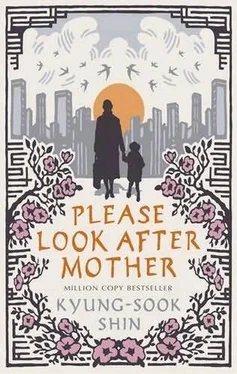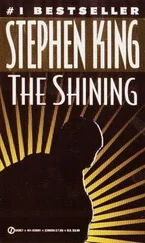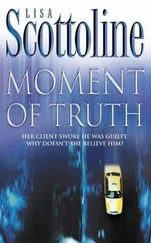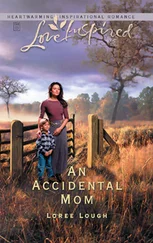“Hey! You!”
His sister, belatedly figuring out what had happened, hurriedly stuck her hands in the pockets of the cotton pants she wore to bed and fidgeted nervously.
“If you’re going to keep this up, just go home!”
When morning came, his sister really went home to Mom, taking all of her things. Mom brought her back to Seoul right away, telling her to get on her knees before him and ask for his forgiveness. His sister, obstinate, didn’t move.
“Ask him to forgive you!” Mom said, but his sister didn’t budge.
His sister was gentle, but if she had her mind set on something, nobody could move her. Once, when he was in middle school, he had forced his sister to wash his sneakers against her will. Usually she obediently washed them clean, but that day she got upset and took them, his new but grubby sneakers, to the creek and sent them downstream. He ran all the way along the creek to retrieve his floating shoes. Later, it became a cherished memory that only siblings could share, but at the time, he came home angry with only one sneaker, which had turned green from the slimy water and clinging algae, and told on his sister. Even when Mom picked up the poker, asking where his sister had learned to be so ill-tempered, she wouldn’t say she was sorry. Instead, she got angry at Mom. “I said I didn’t want to! I told him I didn’t want to! And from now on I’m not going to do anything I don’t want to do!”
In their small room, Mom ordered his obstinate sister: “I told you to ask him to forgive you. I told you your brother was your parent here. If you don’t correct your habit of taking your things and leaving because your brother scolded you, this will stay with you your entire life. If something doesn’t go your way when you are married, are you going to take your things and leave even then?”
The more Mom told her to ask for his forgiveness, the deeper his sister’s hands burrowed into her pockets. Saddened, Mom sighed. “Now this child won’t listen to me. This child is ignoring me because I don’t have anything and have no education.” Only when Mom’s lament turned into teardrops did his sister say, “That’s not it, Mom!” To stop Mom from continuing to cry, she had to say, “I’ll ask for forgiveness, I’ll say I’m sorry,” and she took her hands out of her pockets and asked him to forgive her. From then on, his sister slept with her hands in her pockets. And any time he raised his voice, she’d quickly stuff them there.
After Mom went missing, when someone pointed something out, even something trivial, his stubborn sister would admit, subdued, “I was wrong, I shouldn’t have done that.”
“Who’s going to wash the windows at home?” Chi-hon asks him.
“What are you talking about?”
“If we called around this time of year, Mom was always cleaning the windows.”
“The windows?”
“Yes, of course. She’d always say, ‘How can we have dirty windows when the family will be coming for Full Moon Harvest?’ ”
The many windows of their country home flash before his eyes. The house, newly rebuilt a few years ago, has windows in every room, especially in the living room, unlike the old house, which had one sole windowpane in the door.
“When I suggested that she hire someone to clean the windows, she said, ‘Who’s going to come to this country hole to do that?’ ” His sister heaves a sigh and stretches her hand to the taxi window and rubs it.
“When we were little, she took off all the doors in the house around this time of year-remember?” she asks.
“I do.”
“Do you remember?”
“I said I do!”
“Liar.”
“Why do you think I’m lying? I remember. She used to paste maple leaves on the doors. Even though Aunt gave her a hard time about it.”
“So you really do remember. Remember going to Aunt’s to pick maple leaves?”
“I remember.”
Before the new house was built, Mom would choose a sunny day around Full Moon Harvest and take off every single door in the house. She would scrub the doors with water and dry them in the sun and make some paste and brush new, half-translucent mulberry paper onto the doors. Whenever Hyong-chol saw doors taken off their jambs, drying, leaning against the wall of the house, he would think, Ah, it’s almost Full Moon Harvest.
Why didn’t anyone help Mom brush on the new paper, when there were so many men in the family? His sister probably just fooled around, swirling her finger in the bucket of watery paste. Mom would take the brush and quickly slap the paste on the paper as if she were expertly drawing orchids for a traditional ink painting and, all by herself, would glue the paper on the clean doorframe with sure strokes. Her gestures were lighthearted and cheerful. Mom did work that he wouldn’t dare attempt now, even though he’s much older than she was at the time, and she did it swiftly and with ease. With a big brush in her hand, she would order his sister, who was playing with the paste, or him, who asked whether he could help, to pick Korean-maple leaves. Even though their yard had a lot of trees, persimmon trees and plum trees and trees of heaven and jujube trees, Mom specifically ordered maple leaves, which they didn’t have at home. Once, to get maple leaves, he left the house and passed the alleys and the creek and went all the way down the new road to Aunt’s house. As he picked maple leaves there, Aunt asked, “What are you going to do with them? Did your mother tell you to get them? What is this nonsense that your mother’s doing? If you look at a door with a maple leaf on it in the winter, you feel colder, but she’s going to do it again-even though I’m always telling her to stop!”
When he brought back two handfuls of maple leaves, Mom would neatly place the prettiest ones right next to the handle of every door, one on either side, and paste sheets of mulberry paper over them. The leaves decorated the spot where extra sheets of paper were layered to prevent tearing, right where people touched the door to open and close it. On his door, Mom put three more leaves than on the others, spreading the five leaves like flowers, pressing them carefully with her palms, and asking, “Do you like them?” It looked as if a young child was opening his hand. No matter what Aunt said, they looked beautiful in his eyes. When he said they looked wonderful, a big smile brightened Mom’s face. For Mom, who disliked going into the holidays with holey or ripped doors, worn from being flung open and shut throughout summer, pasting on new door paper was the true start of fall and the beginning of Full Moon Harvest. She probably wanted to keep the family from getting colds from the chillier wind after summer, too. Was that, he wondered, the most romance Mom was able to experience in those days?

He unconsciously sticks his hands in the pockets of his slacks, like his sister. The maple leaves pasted by the door handles stayed with the family in that house after Full Moon Harvest was over. They stayed through winter and snow; they stayed until new maple leaves sprouted in the spring.
Mom’s disappearance was triggering events in his memory, moments, like the maple-leaf doors, he thought he’d forgotten about.
Yokchon-dong isn’t the old Yokchon-dong he remembers. When he first bought a house in Seoul, it was a neighborhood of many alleys and houses, but now it’s crowded with towering high-rise apartment buildings and clothing stores. He and his sister walk back and forth twice, both in front of and behind the apartment buildings, unable to find Sobu Market, which was in the heart of Yokchon-dong back then. Finally, they ask a passing student where the market is, and it turns out it’s in the opposite direction from where they thought it’d be. A big box store has now replaced the telephone booth that he used to walk by every day. He can’t find the yarn store where his wife used to take knitting classes, wanting to make sweaters for their newborn daughter.
Читать дальше












